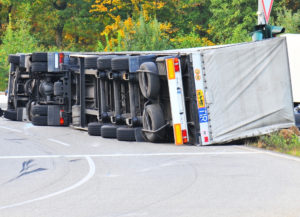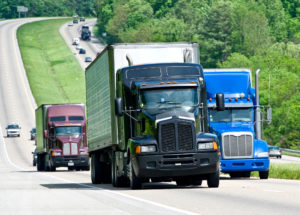
Oregon Truck Roll Over Crashes
What Causes Oregon Truck Roll Over Crashes, Per Our Portland Truck Roll Over Crash Attorney Everyone has seen it, whether in person, or in a
When we hear about a drunk driver accident, we do not typically think of commercial truck drivers causing these types of crashes. But the sad truth is far too many truck drivers unnecessarily cause drunk driving accidents while in big rigs and 18 wheelers. Even though most truck drivers comply with the law, the ones that do not are the truck drivers that place our families at the greatest risk of personal injury or wrongful death. Victims of drunk driving accidents face considerable recovery from their accidents. They may also face physical, emotional, and financial hardships as they recover. If you or a loved one were seriously injured or if a loved one was wrongfully killed by a drunk driver operating a commercial vehicle, please call our Oregon drunk driver lawyers to learn what rights to compensation you may have.
Under Oregon law, victims of personal injury accidents such as drunk driving crashes may be entitled to monetary damages for the losses. Some of the most common damages include the following:
Liability in Oregon Drunk Driving Trucking Accidents Under State Law
It does not matter what state you are from, everyone knows that drunk driving is illegal. This prohibition is provided for under Oregon statutory law (legislatively-made law) and Oregon common law (judge-made law). Drunk driving violations of Oregon statutory law may result in the automatic finding of negligence against an intoxicated drunk driver and trucking company under the doctrine of negligence per se. This means that personal injury victims will be able to establish liability under Oregon law.
In addition, victims can use Oregon common law to establish a negligence cause of action against a drunk truck driver. Negligence is the most common way to prove a personal injury case. In order to establish this type of claim, a party must demonstrate that the defendant failed to exercise reasonable care under the circumstances in the use and operation of his or her motor vehicle. When it comes to drunk driving, the fact that a motorist causes a motor vehicle accident while intoxicated generally leads to a finding of negligence.
Liability for Drunk Driving Trucking Accidents Under Federal Regulations
But that is not the strongest tool for an injured person. There are federal regulations promulgated by the Federal Motor Carrier Safety Administration (FMCSA) which outright prohibit a truck driver from having any alcohol before or during a shift. This standard is stricter than Oregon law which allows for a BAC of .08 for motorists and .04 for commercial truck drivers because the FMCSA regulations prohibit any BAC. In fact, truck drivers are even prohibited from possessing alcohol while they are on shift.
Violations of FMCSA regulations allow a victim to establish evidence of negligence on the part of the truck driver and trucking company. This helps personal injury victims to prove liability for their claims after an 18 wheeler wreck.
Mandatory Alcohol Testing After Certain Oregon Drunk Driving Trucking Accidents
The FMCSA regulations contain provisions which automatically require alcohol testing after certain types of commercial vehicle crashes. This includes if the truck driver gets a ticket or citation from a police officer, if there were serious personal injuries which required immediate medical treatment away from the crash site, if there was a disabled vehicle which must be towed away, or if there was a fatality in the trucking accident.
This testing is important because it will be taken immediately after the big rig crash. In addition to police officers conducting the required tests, the FMCSA also place the burden on trucking companies to test or preserve to test their employees after a trucking accident which has one of the four conditions noted above. This allows victims of Oregon trucking accidents to immediately learn whether they have been the victim of a drunk driving crash so they can prepare a case to protect their rights.
Bend/Portland, Oregon Drunk Driver Accident Lawyers
If you or a loved one have been seriously injured or killed as a result of a trucking accident or collision contact the Oregon Truck Accident Lawyers at Kuhlman Law at our number below or fill out the intake form. We offer a free initial case evaluation and handle cases on a contingency fee which means that you pay no money unless we recover.
We handle cases throughout the state including Bend and Portland Oregon, Redmond, Central Oregon, Multnomah County, Deschutes County, Salem, Eugene, Corvallis, Lane County, Medford, Gresham, Albany, Medford, Beaverton, Umatilla, Pendleton, and Hillsboro.
We also have an office in Minneapolis, Minnesota and take Trucking accident cases throughout the Twin Cities, including St. Paul, Hennepin County, Ramsey County, Dakota County, Washington County, Anoka County, Scott County, Blaine, Stillwater, and Saint Paul Minnesota.
Please act quickly, there is a limited time (Statute of Limitations) in which you can bring a claim under the law.

What Causes Oregon Truck Roll Over Crashes, Per Our Portland Truck Roll Over Crash Attorney Everyone has seen it, whether in person, or in a

Portland Trucking Accident Lawyer Explains Causes for Truck Drivers Speeding and Causing Accidents in Oregon Trucks overpower other vehicles on the road all the time.

Understanding How 18 Wheeler Logbooks in Oregon Trucking Accidents Can Help Prove Big Rig Wrecks Truck drivers drive long days and nights, many times on

COVID-19 Increases Risks of Trucking Accidents: Portland Lawyer Explains COVID Trucking Risks in Oregon Truckers nationwide face a number of challenges now with COVID-19 in

Liability Explained by our Portland Trucking Accident Lawyer: Know Trucking Company Liability for Unrealistic Delivery Schedules Very few if any truck drivers work for themselves.

Liability Under FMCAS Regulations for a Drunk Truck Driver Causing a Portland Trucking Accident Drunk driving is a serious problem. According to the CDC, 29